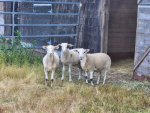Dux
Veteran Member
I'm going to get 4 babies next month, 1 boy, 3 girls. Why waste money on gas when they'll eat the grass? We have about 2 acres. Some fencing would be nice. I hope our old dog can be enough to deflect coyotes. He's not a guardian dog, but gentle with our ducks and cats, 90 pounds. The poodle can't be trusted for a very long time.
This kind of sheep is for meat, doesn't grow wool just hair. No shearing. Kind of ugly and defenseless looking. Said to be friendly, docile, even the rams.
This kind of sheep is for meat, doesn't grow wool just hair. No shearing. Kind of ugly and defenseless looking. Said to be friendly, docile, even the rams.

